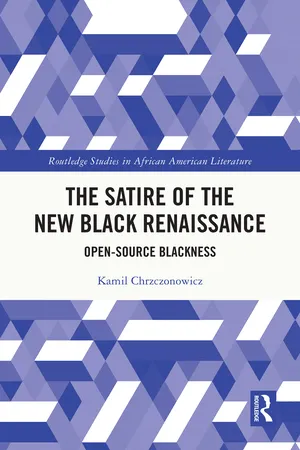
- English
- ePUB (mobile friendly)
- Available on iOS & Android
About this book
How do twenty-first century Black satirists rewrite American ideas of race? This book plunges into the New Black Renaissance – a flowering of the 2000s and 2010s African American culture – and argues that its most potent tool is anti-essentialist satire. The study traces what Baratunde Thurston calls "Open-source Blackness," an ethos that prizes individuality, inclusivity, and remix.
To map this new terrain, this volume offers close readings of three signature works: Percival Everett's metafictional Erasure, Justin Simien's campus satire Dear White People, and Thurston's own multimedia endeavors – his memoir How to Be Black and the playful software experiments developed under the auspices of his company, Cultivated Wit.
Together, these texts show how literature, film, and technology fracture worn stereotypes and invite broader co-creation of (non-)racial identity. The result is the first sustained academic account of Open-source Blackness – of interest to students and scholars in literary, media, and cultural studies.
Frequently asked questions
- Essential is ideal for learners and professionals who enjoy exploring a wide range of subjects. Access the Essential Library with 800,000+ trusted titles and best-sellers across business, personal growth, and the humanities. Includes unlimited reading time and Standard Read Aloud voice.
- Complete: Perfect for advanced learners and researchers needing full, unrestricted access. Unlock 1.4M+ books across hundreds of subjects, including academic and specialized titles. The Complete Plan also includes advanced features like Premium Read Aloud and Research Assistant.
Please note we cannot support devices running on iOS 13 and Android 7 or earlier. Learn more about using the app.
Information
Table of contents
- Cover Page
- Half-Title Page
- Series Page
- Title Page
- Copyright Page
- Contents
- Acknowledgements
- Introduction
- 1 Theory and History: Humor, Race, and Identity in (African) American Culture
- 2 Literature: Anteceding Open-Source Blackness: Erasure (2001) and The Anti-Essentialist Ethos of Percival Everett
- 3 Film: Justin Simien’s Dear White People (2014) and The Introduction of Open-Source Blackness into Mainstream American Culture
- 4 Digital Humanities: Multimedia Satire by Baratunde Thurston
- Coda: Open-Source Blackness: Redefining African American Identity Through Humor, Culture, and Technology
- Index